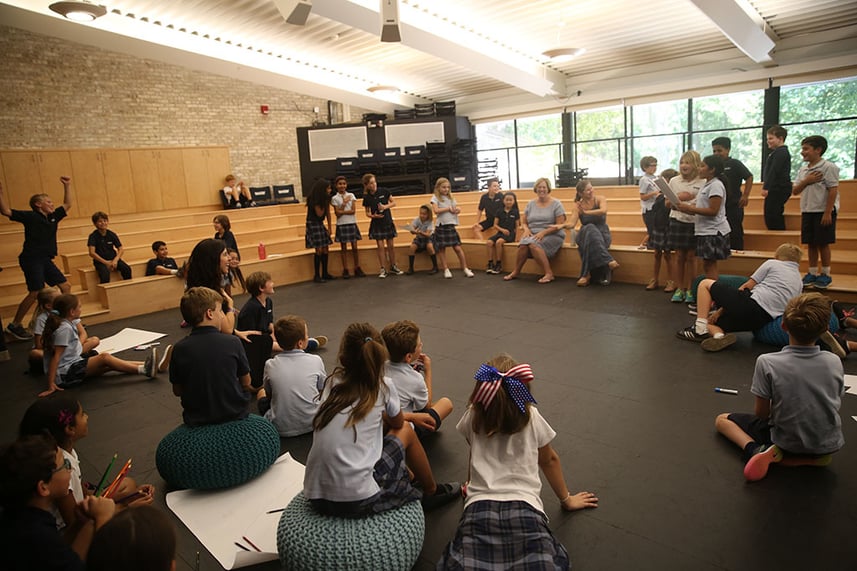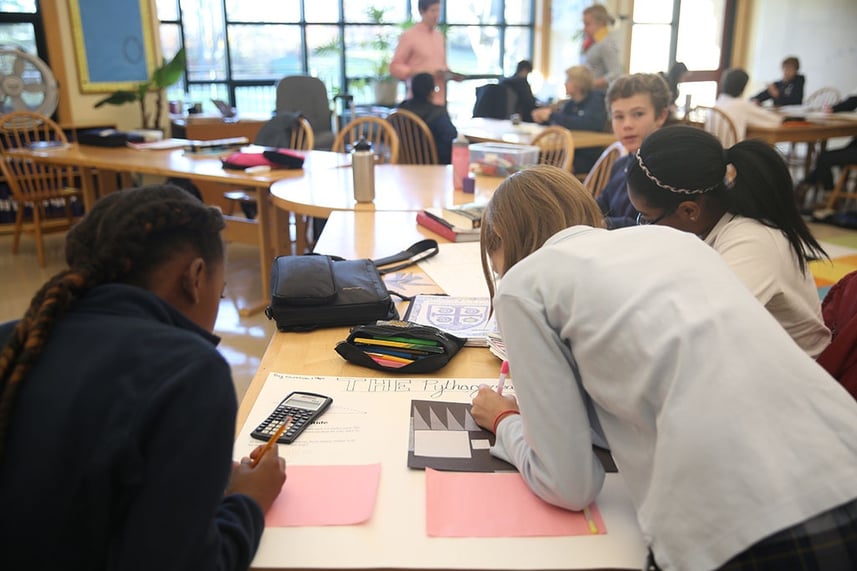Interdisciplinary units are a key component to the IB curriculum and developing children's Approaches to Learning. We sat down with Visual and Performing Arts Curriculum Leader Allyn Rathus to ask her why interdisciplinary units are so important for student and teacher learning.
First of all, how would you describe an interdisciplinary unit?Allyn Rathus: To me, a successful interdisciplinary unit comes out of this sort of shared desire and realization that there are shared skills that the kids will need to learn and need to be exposed to across subject areas.
So, for example, we teach an interdisciplinary unit across 7th grade Individuals and Societies and Theater classes, where we want the kids to explore what makes people act the way that they act. The unit's called, "Do the Right Thing." It's about ethics, it's about persuasion, it's about the power of persuasion, and it's about how both content and presentation are equally important to persuasion. But, it rose naturally out of this desire to figure out why people do what they do. It's something that we study in theater when it comes to the human condition and when it comes to characters, and to characters that we want to give voice to because of what they are trying to do.
There are some communication skills, for example, that they would need to learn and practice in order to feel successful in this ethics unit. They deliver opinion speeches, and so they need those communication skills across the different subject areas. That, to me, is what makes it successful. When they can arise naturally and you don't feel like there's anything forced. You feel like there's actually a genuine, authentic connection between subjects.
You mentioned before you think it would be beneficial to do this with all of your units? Why?
AR: It's a huge learning experience for both the students and the teachers. There's a huge advantage to the student to learning that you might be able to use the same skillset in multiple classes, or they be successful in multiple experiences. I think it's also important for a student that might excel in math, for example, to know that there's actually a part of their learning in theater that they can bring to the theater to make them even more successful in math. Or a student who loves to write, but hasn't really thought about having any desire to say their writing out loud, to realize that by reading out loud, they might actually affect their audience in a slightly different way. Or they might realize that there are certain skills that they can use to affect their audience in a particular way. So I think it's really an advantage to the students to realize there are skillsets that they're learning across curriculum and that can help them across curriculum.

This gives you the chance to be such a better teacher by getting to stretch your own brain outside of the box of your own subject area, and getting to learn more about another subject area.
How does it benefit teachers?
AR: It gives teachers opportunities to learn more about their students. For example, a student that you might have in theater class who never actually really wants to get up on stage might turn out to be a prolific writer or a risk taker in science class or design class. It gives us such a bigger picture of the strengths of that student, and of how we can help them in their practice of skills, to sort of cater them towards those strengths and make more of a meaningful connection there for the student.
I think that a lot of us who are teachers, have a love of learning. This gives you the chance to be such a better teacher by getting to stretch your own brain outside of the box of your own subject area, and getting to learn more about another subject area. I think when you can find out why word choice matters in English, it makes all the more sense why it would matter in a theater class. Again, it really forges meaningful connections, and it really causes you to stretch your own thinking.
Do you have any examples of when you've really noticed that in yourself for any particular unit?
AR: It just clicked for me with the 8th grade interdisciplinary unit that I'm working on with one of our English teachers. The reason why we were doing it just clicked. We agreed that as one of the assessments in both English and Theater, students would write a fictional piece and then they would choose an excerpt from that piece to deliver orally and they would work on their public speaking skills through their delivery of that excerpt.
When the students read aloud some of their excerpts, not only did I realize how amazing the 8th grade students are as writers, but I was really, seriously impressed by the language that they were using. Not only do I have this new understanding myself, of what an 8th grade writer can do, but I had this realization that they were painting such a vivid picture with their words. And they were creating such an intentional experience for their audience, no matter who their audience was. And obviously, since they were writing on the page, they were intending it for a reader. So, when they got up, they weren't painting the same kind of vivid picture with their presentation of their words, with their delivery of their words. And that was fine, because that wasn't the goal of the day.
But moving forward, that is what they can do with it. They can present their words, deliver their words in such a way that they really put somebody in the middle of a rainstorm. Or they put somebody in the middle of a stranded highway, or a road where they're lost in the woods and don't know what's gonna happen next. And that the combination between how they present it and what they choose to do with their tone of voice, and with whatever emphasis they use, and with whatever emotion can be heard and can be seen on their face, can equal the power of the words. And so that's really when that clicked for me for the first time.

To rewind a little bit, you mentioned the interdisciplinary skills between theater and math. I think it may be more obvious in other examples how skills can overlap...but something like theater and math, what's an example you can give between those two classes?
AR: Well, it's interesting because I could give examples like being able to present a proof, or being able to persuade somebody about the solution that you come up to with a problem. I could give examples like that, which would definitely include communication skills from theater class. But, if I were to go a different route with my explanation, I might cite something like the improvisation unit that I'm currently doing with 5th graders. The entire purpose of that unit is to learn about problem solving. The lens through which they're learning about problem solving is improvisation. But the goal isn't necessarily to become great at improvisation, it's to become great at problem solving. Or to improve on problem solving. So, we're looking at skills like collaboration skills. We're looking at the idea of trying to help others to succeed. We're looking at the structural elements of improvisation like, say, "Yes and," rather than putting a stop to something by saying, "no." We're looking at making sure you understand what your role is within the circumstance that you're in. We're looking at understanding relationships depending on different roles that you take, or that are assigned to you. And we're looking into what it means to sort of have a sense of urgency behind the solving of the problem.
The connections aren't always obvious. But we've got critical thinking skills and creative thinking skills and transfer skills and communication skills that apply to everything. So it's just noticing where there are actually meaningful things that are being studied in two subject areas, and then bringing those together. Not forcing it, but bringing together what's already existing there and what's already working.
Cultivating an appreciation for, and a love of theater by realizing how its skills can apply to anything that you do, is what my main goal is with the students.
What you just said makes a lot of sense. The connections aren't always obvious, the situations that you're going to face in life aren't always going to be obvious either, but if you have those skills, you'll be ready to face them.
AR: I know that I'm not training a hundred Upper School actors who want to go out and find an acting job. What's happening here is different, and I try to present each group with leadership skills they can learn and with skills that they can transfer from this subject to another subject because cultivating an appreciation for, and a love of theater by realizing how its skills can apply to anything that you do, is what my main goal is with the students.


